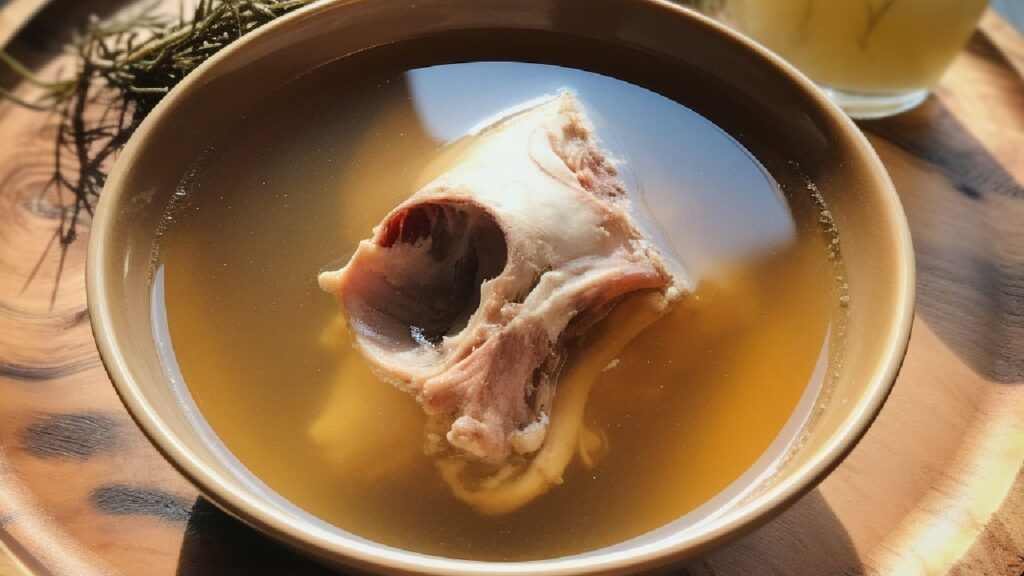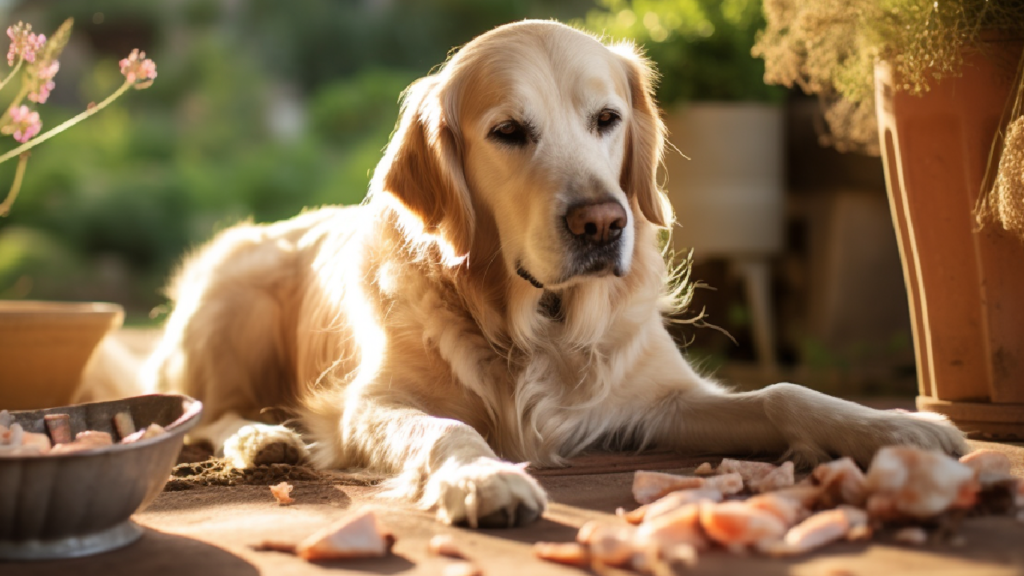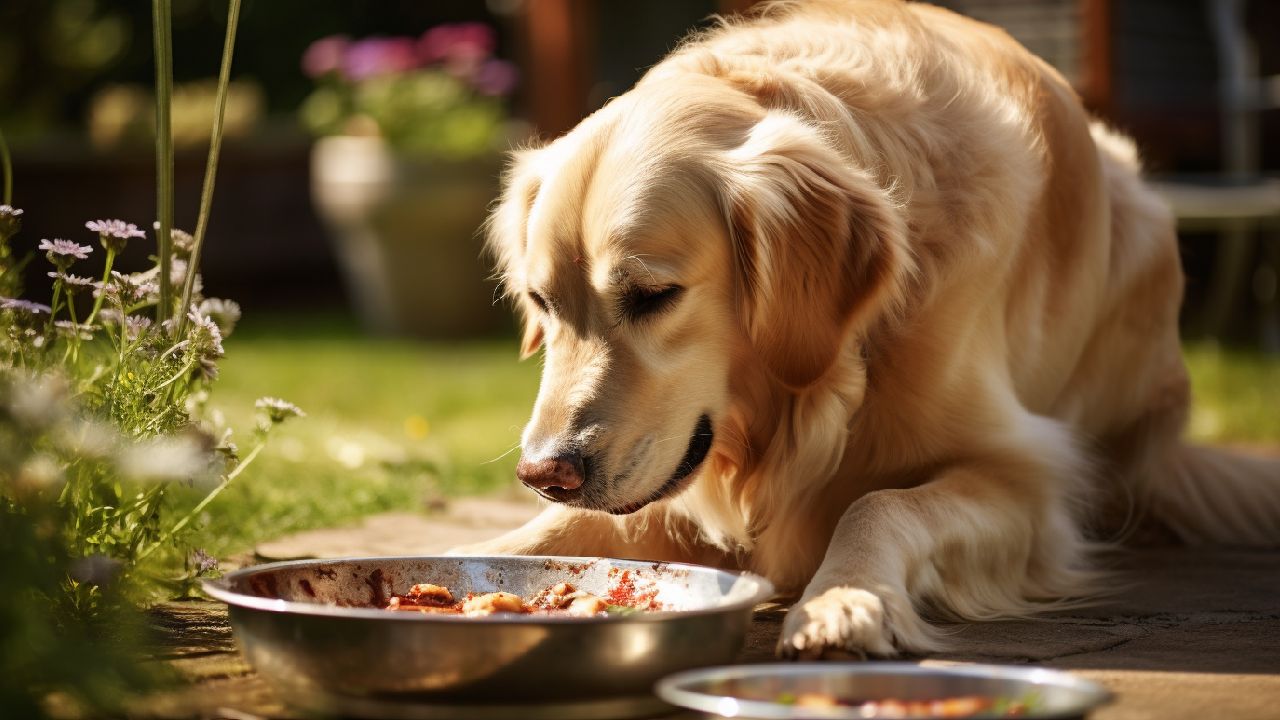If you’re a devoted dog owner, you’ve probably heard about the many health trends that promise to boost your furry friend’s vitality. One such trend that’s gained significant attention is bone broth for dogs.
But the question is, “Is bone broth good for dogs?” In short, the answer is a resounding Yes! In this article, we will delve into the world of bone broth, discussing its benefits, safety, precautions, and how to incorporate it into your dog’s diet.
What is Bone Broth?
Bone broth, a time-honored concoction celebrated for its nourishing properties, arises from the gentle simmering of animal bones, such as those from cows, chickens, or fish, alongside cartilage, tendons, and connective tissues, in water for an extended duration.
This unhurried culinary alchemy, often spanning from 12 to 48 hours, extracts many vital elements from the bones, elevating them to a potent elixir. The outcome is a liquid brimming with essential components. Collagen, an abundant structural protein in bones, skin, and connective tissues, transforms into gelatin during this process.
Gelatin, a core constituent of bone broth, underpins skin health, joint function, and tissue repair. It’s worth noting that bone broth should be viewed as a supplement rather than a primary nutritional source for your four-legged companion.
Bone broth can become a flavorful and healthful addition to your dog’s culinary repertoire when crafted and served with care.
Is Bone Broth Safe for Dogs?: Benefits of Bone Broth
Bone broth, with its myriad benefits, is generally safe for dogs when incorporated into their diet thoughtfully and responsibly. Here’s why it’s considered safe:
- Natural Ingredients:
Homemade bone broth typically consists of minimal, natural ingredients—bones, cartilage, and connective tissues simmered in water. There are no synthetic additives or preservatives that might be harmful to dogs.
- Rich Nutrient Profile:
Bone broth provides an array of essential nutrients, including collagen, amino acids, minerals, and vitamins. These elements can contribute positively to your dog’s overall health, from joint support to improved coat condition.
- Digestibility:
Bone broth is accessible in a dog’s digestive system, making it suitable for pets with sensitive stomachs or those recovering from illness.
- Hydration:
As a liquid, bone broth offers hydration, which is vital for your dog’s well-being. Ensuring your dog remains adequately hydrated is essential for their overall health.
- Flexible Feeding Options:
Bone broth can be incorporated into your dog’s diet in various ways. It can be served as a standalone treat, mixed with their regular food, or used as a base for homemade dog food recipes.
- Support for Specific Conditions:
Some dogs may experience specific health benefits from bone broth. For instance, dogs with joint issues may find relief from the naturally occurring glucosamine and chondroitin in bone broth.

Precautions and Possible Side Effects of Bone Broth for Dogs
While bone broth offers several health benefits for dogs, it’s essential to be aware of potential precautions and side effects to ensure your furry friend’s well-being.
Fat Content
Bone broth can contain varying amounts of fat, depending on the source and preparation method. Excessive fat intake can lead to digestive upset, including diarrhea or pancreatitis, especially in dogs prone to these issues. To mitigate this risk, skim off any visible fat from the broth before serving it to your dog.
Monitor for Digestive Issues
Keep an eye on your dog’s digestive health when introducing bone broth. If you notice any signs of digestive upset, such as diarrhea or vomiting, discontinue the bone broth and consult your veterinarian.
Sodium Levels
High sodium content can be a concern, especially in commercial bone broths or those prepared with added seasonings. Opt for low-sodium or salt-free bone broth options, and avoid adding extra salt when making homemade bone broth for your dog.
Allergies and Sensitivities
Dogs can have allergies or sensitivities to certain ingredients. Be cautious if introducing bone broth with additional ingredients like vegetables or spices. Monitor your dog closely for any signs of allergic reactions, such as itching, skin irritation, or digestive issues.
Overfeeding
While bone broth is a healthy addition to your dog’s diet, overfeeding can lead to excess calorie intake, potentially resulting in weight gain. Ensure that the additional calories from bone broth are accounted for in your dog’s daily calorie intake to maintain a healthy weight.
Bones in Homemade Broth
If you prepare bone broth at home, remove all cooked bones before serving it to your dog. Cooked bones can splinter and pose a choking hazard or lead to intestinal blockages. Always err on the side of caution when it comes to bones.
By being mindful of factors such as fat content, sodium levels, allergies, and gradual introduction, you can make bone broth a positive addition to your dog’s diet without adverse side effects.

How to Feed Your Dog Safely?
Feeding bone broth to your dog can be a wholesome addition to their diet, provided you follow these safety guidelines:
- Use High-Quality Ingredients:
Ensure that you start with high-quality ingredients. Choose bones from trusted sources, ideally organic or grass-fed. The quality of the bones will significantly impact the nutritional value and safety of the bone broth.
- Homemade or Commercial Options:
You can make bone broth at home or opt for commercially available bone broth for dogs. Regardless of your choice, read labels carefully to ensure no harmful additives, preservatives, or excessive salt content.
- Bone Removal:
If you prepare bone broth at home, thoroughly remove all cooked bones from the broth before serving it to your dog. Cooked bones can splinter and pose a choking hazard or lead to intestinal blockages.
- Portion Control:
Be mindful of portion sizes. Bone broth should be considered a supplement, not a primary source of nutrition. Adjust the serving size based on your dog’s size, age, and dietary needs.
- Avoid Seasonings and Additives:
Refrain from adding seasonings, spices, onions, garlic, or other ingredients that can be toxic to dogs when making homemade bone broth. Stick to simple, dog-safe ingredients.
- Consult with Your Veterinarian:
Before making significant changes to your dog’s diet, consult your veterinarian, especially if your dog has underlying health conditions or specific dietary requirements. Your vet can provide personalized guidance on incorporating bone broth safely into your dog’s nutrition plan.
Following these safety precautions and guidelines ensures that bone broth is a safe and beneficial addition to your dog’s diet. Prioritize your dog’s health and well-being and make informed decisions regarding their nutrition.
Conclusion
Bone broth can be a nutritious and beneficial addition to your dog’s diet, offering a range of potential health advantages. Bone broth can help support joint health, improve coat condition, and aid digestion when prepared and served with care.
However, always prioritize your dog’s safety and well-being by using quality ingredients, following proper preparation methods, and monitoring their response.

FAQs
How often should I feed my dog bone broth?
Start with small amounts and gradually increase. One to two tablespoons daily is a reasonable serving size for most dogs.
Can I give bone broth to puppies?
Bone broth can benefit puppies, but it should be introduced gradually and in moderation. Puppies have specific dietary requirements for growth, so consult your veterinarian to ensure that bone broth complements their puppy food appropriately.
Can bone broth help with a dog’s skin and coat health?
Yes, bone broth’s collagen content can improve dogs’ skin and coat health. The amino acids in bone broth support healthy skin, reduce itching, and promote a shinier coat. However, results may vary depending on individual dogs.
Can I mix bone broth with my dog’s regular kibble or wet food?
Absolutely! Bone broth can enhance the flavor of your dog’s regular food, making it more enticing. It can also help soften kibble, which may benefit dogs with dental issues or those with trouble chewing hard food.
Can I feed bone broth to a senior dog with dietary restrictions?
Bone broth can be an excellent addition to a senior dog’s diet with dietary restrictions. It’s gentle on the digestive system and can provide essential nutrients for older dogs. However, always consult your veterinarian to ensure that bone broth meets your senior dog’s dietary needs and restrictions.






bone broth is a new addition to our dog’s diet and he loves it! is that homemade recipes you swear by for your pups? 🍲
Bone broth is all the rage, but is it really beneficial for our furry friends? My dog is a picky eater, so I’m curious to try new things. 🍖🐕